News
Galle Fort: ‘The heritage is vanishing before our eyes’
View(s):- Long term residents decry traffic, garbage woes and corruption
- Business stakeholder calls for structured contribution facilitated by the authorities so that hotel industry could give back to the Fort’s community
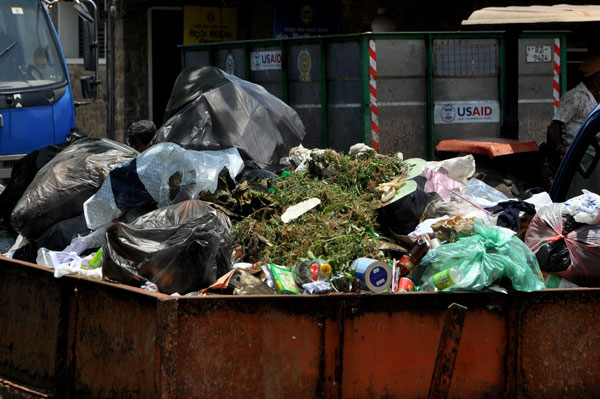
Garbage piles build up especially during long weekends. Pix by Priyanka Samaraweera
By Tharushi Weerasinghe
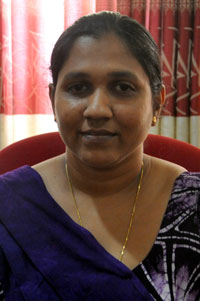
Galle Municipal Commissioner R.M.T.K. Rasnayake
“I have lived here for 70 years and seen the Fort transform tremendously over that time,” said Prof. Mohammed Rifdy. He noted that upkeep of public spaces like the ramparts was inconsistent. “Volunteers do a lot of the cleaning, but it’s sporadic. The bins are far apart, so garbage ends up strewn around.”
He also pointed to worsening traffic. The Fort’s inner roads, better suited for walking than vehicles, often get choked on weekends, especially when restaurants extend tables and chairs onto the streets. “Having a medical emergency on a public holiday is a real risk. You won’t be able to get out, or get an ambulance in,” added another resident, who felt traffic plans failed to reflect the Fort’s structural limitations.
A one-way system trialled last year was abandoned after residents complained it was inconvenient.
“The term ‘resident’ in the Fort is complicated,” said attorney-at-law Usman Anver, who felt some recent business owners were prioritised over long-term inhabitants. “This is my home. The people who’ve kept the spirit of the Fort alive for generations are now being pushed aside in favour of those who cut corners and fuel municipal corruption.”
Anver said many businesses are respectful of the Fort’s character, and residents do appreciate old properties being revived for tourism.
The issues for other residents, however, hit very close to home. For Dr. S.J. Mohammed Ali, a retired senior lecturer from the University of Ruhuna, her retirement was getting mired in pollution. Her ancestral home in the Fort had belonged to her family for almost 400 years, but is now attached to a popular restaurant within the Fort that advertises wood oven pizzas. The heat from the oven next door has caused cracks to appear across her wall. The smoke from the chimney of the wood oven was also making air pollution an issue. “We are breathing the smoke from next door 24/7, and it is terrible.”
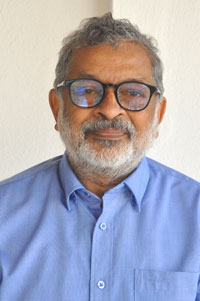
Prof. Mohammed Rifdy
While complaints have been made to the relevant authorities for over three years, no responsibility nor action has been taken. While grievance mechanisms to mediate between businesses and residents exist, Dr. Ali felt that corruption within the municipality was an issue and that the law was applied disproportionately to stakeholders. “But there is a clear imbalance in how the law is applied—while I need official permission just to drive a nail into my wall, entire spaces are being altered or removed by other stakeholders without consequence,” she noted.
Because the Fort falls under the Department of Archaeology, construction or renovation requires prior approval. “The heritage is vanishing before our eyes,” she said. “This is a living heritage site, and it is we, the residents, who give it life, without us it becomes just a namesake.”
“We haven’t received any formal complaints about wall damage, but we’re ready to resolve such issues through civil law,” said C. Padmasiri from the Galle Department of Archaeology.
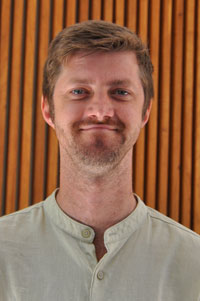
Ivo Richil
Mr. Padmasiri said all new construction must be approved by the Galle Heritage Foundation and conform to a 33-foot height limit. “Restaurants and other businesses must also be officially gazetted,” he added. “We understand many locals left the Fort for financial reasons, so we’ve created a process to help them start businesses within heritage guidelines.”
However, the lack of transparent zoning laws and the rapid pace of commercialisation have made it increasingly difficult to run legitimate tourism businesses within the Fort, according to Ivo Richil, who manages a boutique hotel in the area. “We need clear administrative support to understand where and how we can operate within the regulatory framework,” Mr.Richil said. “Businesses that comply with tourism laws should be encouraged, not penalised, because they contribute to the local economy and help bring in more revenue.”
He emphasised that the hotel industry, in particular, should do more to give back to the Fort’s community—but that kind of structured contribution needs to be facilitated by the authorities. “The people of Galle are part of the charm for our guests,” he said. “Hotels need to reinvest in the community. The tensions between hoteliers and long-time residents are real, and bridging that gap requires leadership and collaboration.” Mr. Richil also echoed concerns raised by residents about mounting traffic and poor waste management. “Our guests often comment on the tidiness of the Fort, especially during longer stays,” he said. “Unfortunately, garbage is one of the biggest issues we face. Piles build up during long weekends—it’s unsightly, it smells, and it’s unacceptable.”

Dr. S.J. Mohammed Ali
He described how efforts to address the issue independently had met resistance. “We wanted to bring in an independent contractor for waste collection, but faced pushback. The authorities told us they wouldn’t collect our garbage at all if we did that,” he said. Food waste is only collected once every two days, which is insufficient for a hotel that feeds many guests and staff three meals a day. “The tractor used isn’t cleaned properly, and it smells awful, which makes it difficult to sell a luxury experience.” He added that the lack of a reliable system, which forces people to improvise, was a problem. “There have been weekends when our bins have been overflowing the entire time.” Traffic is also a persistent concern. “Traffic wardens could help instil some discipline,” Mr. Richil suggested. “Right now, enforcement is inconsistent. Guests are sometimes harassed or ticketed arbitrarily for parking in spaces that aren’t marked.”
Galle Municipal Commissioner R.M.T.K. Rasnayake acknowledged the challenges, adding that the Fort remains a top priority despite resource constraints.
“Garbage is removed daily, and polythene is collected twice a week,” she said. “We prioritise the Fort four to five days a week, but we need at least two more tractors to keep up.”
She said the council has requested new compactors, which can carry four tonnes per load and contain the smell better. Two additional tractors are also expected within the year.
She also responded to complaints made by another resident about sewage cleaning, which was lagging and causing mosquito infestations. She noted that underground drains are cleaned twice a year, but sea-facing outlets, eight in total, get blocked by sand during the monsoon. “These can only be cleared from the seaside,” she said. “Earlier, the drain system had manholes that made cleaning easier. The current setup is harder to access.”
She acknowledged the tensions between residents and businesses. “These issues exist, and we try to mediate fairly. When that fails, people go to court. We need to help businesses while respecting residents.”
Despite its challenges, the Fort receives the lion’s share of municipal resources in Galle. “We have 15 staff members assigned to clean the Fort premises,” Commissioner Rasnayake said. “We even employ 10 retired workers at a daily rate of Rs. 1,500 to help manage the workload, even though this does not necessarily generate income for the council—it’s about our responsibility to preserve the Fort and support tourism.”
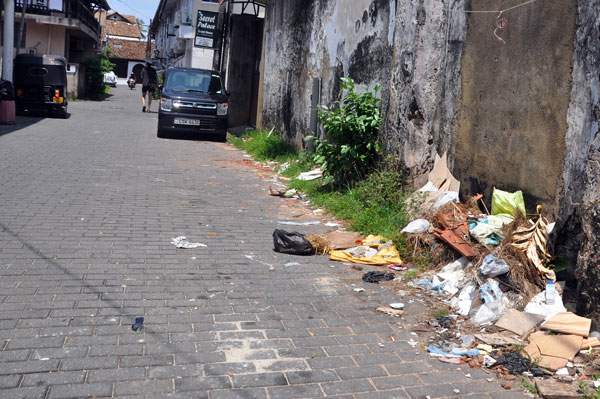
Unsightly: Here a garbage, there a garbage within a heritage site
However, she pointed to long-standing complications around property maintenance. “There are buildings in poor condition, but determining ownership is a challenge. We can’t maintain or demolish a structure unless it’s legally clear who’s responsible.”
Commissioner Rasnayake also acknowledged that traffic continues to be a pressing concern. “We are planning to reduce the number of vehicles entering the Fort. The Courts Complex will be moved out, which should ease congestion. We’ve proposed a shuttle service with the Urban Development Authority (UDA), and are also exploring a one-way traffic system within the Fort.” She noted that an earlier attempt at a one-way system had been abandoned due to resident pushback. “It was more convenient for guests, but those living inside said it made their daily commutes unnecessarily long. Still, we’re looking at revisiting it.”
Looking ahead, Ms. Rasnayake said the UDA’s ‘Greater Galle’ scheme includes plans to convert underutilised government buildings into tourist hubs. “We’re working closely with them to create more structured, sustainable spaces for tourism while protecting the unique character of the Fort,” she said.
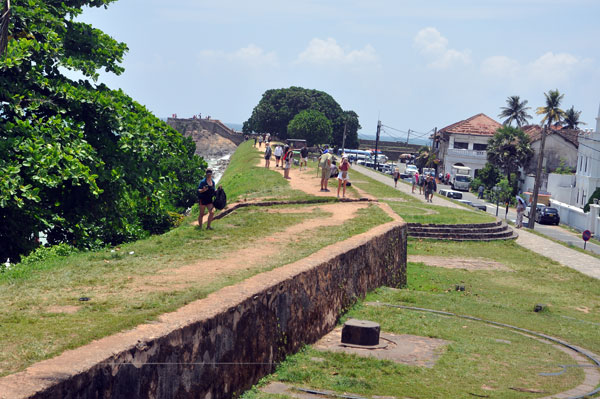
Long-term residents of Galle Fort say they have been pushed aside
The best way to say that you found the home of your dreams is by finding it on Hitad.lk. We have listings for apartments for sale or rent in Sri Lanka, no matter what locale you're looking for! Whether you live in Colombo, Galle, Kandy, Matara, Jaffna and more - we've got them all!

